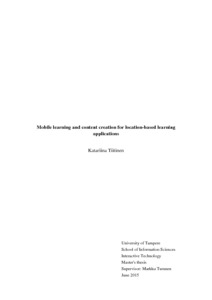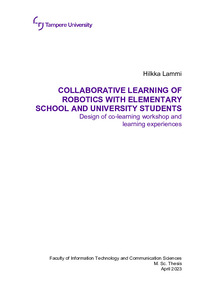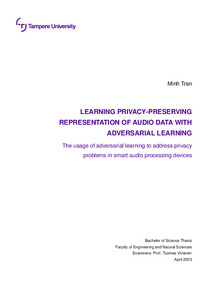Mobile learning and content creation for location-based learning applications
Tiitinen, Katariina (2015)
Tiitinen, Katariina
2015
Vuorovaikutteinen teknologia - Interactive Technology
Informaatiotieteiden yksikkö - School of Information Sciences
This publication is copyrighted. You may download, display and print it for Your own personal use. Commercial use is prohibited.
Hyväksymispäivämäärä
2015-06-16
Julkaisun pysyvä osoite on
https://urn.fi/URN:NBN:fi:uta-201506301974
https://urn.fi/URN:NBN:fi:uta-201506301974
Tiivistelmä
Using mobile devices to enable new ways of learning has been a big area of interest in research for quite some time. Mobile devices have the opportunity to foster free movement and enable structured context-aware learning activities regardless of time and location restrictions. The increased amount of mobile devices and advances in mobile technologies has made creating these new learning applications a reality. This thesis discusses the possibilities mobile learning offers to the field of education and the type of actions that must be taken in order to support the adoption of m-learning.
Mobile learning is discussed by first looking at the history of technology enhanced education and the special affordances that mobile devices have to offer. In order to create applications that can provide meaningful learning experiences and go beyond the novelty factor of using mobile devices, supportive pedagogies must be developed and integrated into tools that can be used in designing learning content for these applications. The main concepts and pedagogies for mobile learning are discussed by looking at some example applications and previous research.
The main challenge for adopting m-learning in practice is to develop generic and easy to use tools for the educators to author the learning content to be used. This thesis focuses especially on content creation for location-based mobile learning applications and presents some examples of existing solutions. As a result from the constructive part of this thesis this kind of tool was also developed as a part of the Seek'N'Share platform for location-based mobile learning.
Mobile learning is discussed by first looking at the history of technology enhanced education and the special affordances that mobile devices have to offer. In order to create applications that can provide meaningful learning experiences and go beyond the novelty factor of using mobile devices, supportive pedagogies must be developed and integrated into tools that can be used in designing learning content for these applications. The main concepts and pedagogies for mobile learning are discussed by looking at some example applications and previous research.
The main challenge for adopting m-learning in practice is to develop generic and easy to use tools for the educators to author the learning content to be used. This thesis focuses especially on content creation for location-based mobile learning applications and presents some examples of existing solutions. As a result from the constructive part of this thesis this kind of tool was also developed as a part of the Seek'N'Share platform for location-based mobile learning.
Kokoelmat
Samankaltainen aineisto
Näytetään aineisto, joilla on samankaltaisia nimekkeitä, tekijöitä tai asiasanoja.
-
The impact of digitalisation on learning situations, learning and learning outcomes in lower secondary schools : Initial results and recommendations of a national research project
Oinas, Sanna; Vainikainen, Mari-Pauliina; Asikainen, Mikko; Gustavson, Natalija; Halinen, Joona; Hienonen, Ninja; Kiili, Carita; Kilpi, Nestori; Koivuhovi, Satu; Kortesoja, Laura; Kupiainen, Reijo; Lintuvuori, Meri; Mergianian, Cristiana; Merikanto, Ilona; Mäkihonko, Minna; Nazeri, Faruk; Nyman, Laura; Polso, Kukka-Maaria; Schöning, Oskari; Svedholm-Häkkinen, Annika M.; Vanhanen, Sanna; Hotulainen, Risto (Tampere University, 2023)
report -
Collaborative Learning of Robotics with Elementary School and University Students : Design of co-learning workshop and learning experiences
Lammi, Hilkka (2023)
Pro gradu -tutkielmaIn the future, the number of robots and their areas of application are expected to increase. Robotics literacy, knowledge and understanding of what robots are and what are their features, is a skill needed to form an ... -
Learning privacy-preserving representation of audio data with adversarial learning: The usage of adversarial learning to address privacy problems in smart audio processing devices
Tran, Minh (2023)
KandidaatintyöRecently, the development of IoT leads to numerous automated machine listening systems be ing introduced. In the audio signals processed by these systems, human voice also exists, which poses a threat of leakage of privacy ...



